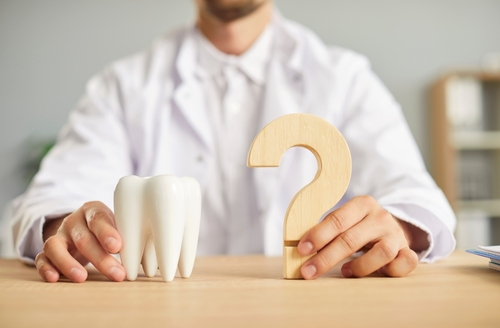
When considering dental implants, many factors come into play, from your overall oral health to the skills of your dental professional. Recently, however, a lesser-known aspect has drawn attention: genetics. As surprising as it may seem, genetic factors can play a significant role in the success or failure of dental implants.
If you asked any dental implant specialist in Mira Mesa, they’d tell you that understanding how your genetics influence dental implant success can significantly improve treatment outcomes. Let’s dive deeper into the relationship between genetics and dental implant outcomes and explain common concerns like bone loss, healing issues, and implant failures.
Can my genes affect how well dental implants work?
Your genetic makeup can indeed influence how effectively dental implants integrate and heal. Genetic factors affecting dental implants primarily relate to your body’s healing response and bone density, both crucial components for implant stability.
1. DNA and dental implant healing
DNA and dental implant healing are interconnected since genetic markers can determine how quickly and effectively your body regenerates tissues after surgery. Some individuals naturally possess superior bone healing capabilities due to genetic predispositions, leading to quicker and stronger implant integration. Conversely, those with slower healing genetics may experience longer recovery times, requiring more vigilant post-operative care and monitoring.
Research has identified certain genetic markers associated with collagen production, essential for bone strength and tissue repair. Variations in these markers can directly influence how quickly the jawbone integrates with the dental implant. This genetic insight is crucial for dental professionals to predict patient outcomes accurately and provide customized recovery strategies.
2. Genetic inflammatory responses
Your genes play a vital role in inflammatory responses, potentially impacting gum health and overall oral hygiene. Genetic predispositions toward inflammation can negatively affect the healing process and stability of dental implants. Individuals genetically prone to chronic inflammation may face additional challenges in maintaining implant stability, which shows how important personalized treatment plans are.
Additionally, studies have shown that genetic markers can influence your susceptibility to infections, another critical factor in implant success. Those genetically prone to higher inflammatory responses may require proactive preventive measures, such as specialized dental hygiene routines, targeted medications, or dietary changes, to minimize inflammation-related implant complications.
Is dental implant failure linked to genetics?
While implant failure due to genetics isn’t extremely common, it does happen. Genetic conditions, either directly or indirectly, affect oral health and consequently influence dental implant outcomes.
1. Family history of gum disease and implants
Individuals with a family history of gum disease and implants might experience heightened risks. Genetic susceptibility to gum disease increases inflammation around implants, potentially causing implant complications or failures. Preventive dental care routines are crucial for these individuals to mitigate potential risks effectively.
Research shows a significant correlation between genetics and gum disease severity. Specific genetic markers predispose individuals to heightened gum sensitivity, increased plaque buildup, and higher rates of periodontal disease. Regular dental check-ups, professional cleanings, and personalized oral hygiene practices become essential to counteract these genetic influences and maintain healthy implants.
2. Osteoporosis and dental implant success
Osteoporosis, characterized by diminished bone density, significantly reduces the jawbone’s ability to support implants securely. Those with genetic predispositions to osteoporosis should undergo thorough assessments, including bone density scans, before implant placement. Early identification allows dentists to implement specialized interventions to ensure better implant stability and reduce failure risks.
Patients with genetic markers for osteoporosis might require additional bone-strengthening treatments before dental implant surgery. These treatments may include dietary modifications, calcium and vitamin D supplementation, or medications specifically formulated to improve bone density. Incorporating these strategies significantly improves the likelihood of successful dental implant integration and longevity, despite hereditary risks.
Should I worry about bone loss if it runs in my family?
Hereditary bone loss and dental implants are valid concerns because genetic predispositions to bone diseases significantly affect implant outcomes. Osteoporosis decreases bone density, weakening the jawbone’s capacity to secure implants effectively.
1. Diagnostic measures for hereditary bone loss
Your dentist may recommend diagnostic tools, such as bone density scans, to accurately assess your suitability for implants if hereditary bone loss is known in your family. These scans enable the identification of bone density issues before implant placement, ensuring tailored interventions are provided to strengthen your jawbone.
Advanced diagnostic procedures, such as computed tomography (CT) scans, provide precise insights into bone structure and density. These technologies help dentists develop comprehensive treatment plans tailored to each patient’s genetic profile, ensuring optimal preparation and minimizing the risk of implant failure due to bone insufficiency.
2. Personalized dental care plans
Preventive measures could include dietary adjustments, calcium supplements, or medications specifically aimed at boosting bone density. Early identification and tailored dental care plans are critical in ensuring successful outcomes for patients concerned with hereditary bone loss and dental implants.
Personalized dental care often extends beyond clinical measures, including lifestyle counseling, nutrition guidance, and regular monitoring. For instance, dental professionals might advise incorporating weight-bearing exercises known to improve bone density or recommend avoiding habits that could accelerate bone loss, such as smoking or excessive alcohol consumption. These personalized strategies significantly enhance dental implant success, even in patients genetically predisposed to bone health challenges.
 How do I find a reliable dental implant specialist in Mira Mesa and the surrounding area?
How do I find a reliable dental implant specialist in Mira Mesa and the surrounding area?
With years of experience and the latest in diagnostic and surgical technology, Dr. Tsvetov at Temecula Center for Dental Implants provides personalized implant solutions that last. Our office is fully equipped to support your dental goals. We offer detailed consultations, comprehensive aftercare, and reasonable pricing to fit your needs. Let us help you protect your smile wherever life takes you, Let us help you protect your smile wherever life takes you — whether you’re an athlete with an active lifestyle, preparing to travel soon after you get your implants, or simply want to feel confident speaking clearly again. If you live close to the Mira Mesa Recreation Center, you’ll be at the office in no time. Schedule your visit today!

 How do I find a reliable dental implant specialist in Mira Mesa and the surrounding area?
How do I find a reliable dental implant specialist in Mira Mesa and the surrounding area?